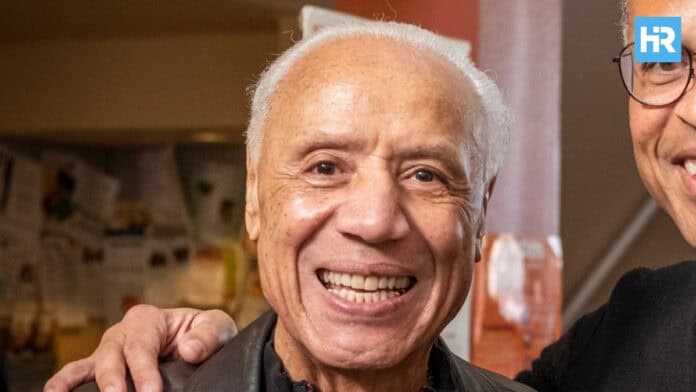Lenny Wilkens, one of the most respected figures in basketball history, passed away on November 10, 2025, at the age of 88. His family confirmed that he died surrounded by loved ones, though no cause of death was shared.
NBA Commissioner Adam Silver described Wilkens as “one of the game’s most respected ambassadors” and said he “represented the very best of the NBA as a Hall of Fame player, Hall of Fame coach, and leader who influenced generations.”
- Lenny Wilkens, a three-time Hall of Fame inductee and 1979 NBA champion coach, passed away on November 10, 2025, at the age of 88.
- He achieved 1,332 coaching victories over a 32-season career and was named one of the NBA’s 75 greatest players and 15 greatest coaches.
- Beyond basketball, Wilkens was a mentor, philanthropist, and community leader in Seattle, where a statue now honors his impact.
Early Life and Rise to NBA Stardom
Leonard Randolph Wilkens was born on October 28, 1937, in New York City and raised in Brooklyn. He developed his skills on neighborhood playgrounds before starring at Boys High School, where one of his teammates was future baseball player Tommy Davis.
Wilkens continued his success at Providence College, where he became one of the program’s greatest players. His No. 14 jersey was retired in 1996, and he was inducted into the College Basketball Hall of Fame in 2006.
He entered the NBA in 1960 as the sixth overall pick by the St. Louis Hawks. Over 15 seasons, Wilkens became known for his intelligence and unselfish play. He was a nine-time All-Star, averaging 16.5 points and 6.7 assists per game across 1,077 games. During the 1967–68 season, he finished second to Wilt Chamberlain in MVP voting.
After eight seasons in St. Louis, Wilkens was traded to the Seattle SuperSonics before the 1968–69 season. In his first year with Seattle, he averaged a career-high 22.4 points per game, earned three more All-Star selections, and became one of the most popular figures in the franchise’s early history.
Transition from Player to Coach and NBA Championship Success
Wilkens’ transition into coaching began in 1969, when Seattle SuperSonics general manager Dick Vertlieb approached him about becoming a player-coach. Wilkens later recalled his initial reaction, saying, “I thought he was crazy. I kept putting him off, but he was persistent. Finally, we were getting so close to training camp, so I said, ‘What the heck, I’ll try it.’”
The experiment became a turning point in his career. During the 1971–72 season, he led Seattle to a 47–35 record while continuing to excel on the court. One game left a lasting impression on him when a coaching decision he made changed the outcome. Wilkens said, “I was like, ‘Wow!’ I had just done something as a coach that helped us win, not as a player.”
Following that season, he was traded to the Cleveland Cavaliers, where he earned his final All-Star appearance in 1973, averaging 18 points and 8 assists per game. He played one more season before being traded to the Portland Trail Blazers, serving again as player-coach during the 1974–75 season, which was his last as a player.
Wilkens transitioned fully into coaching the following year and later returned to Seattle to guide the SuperSonics to their only NBA Championship in 1979, defeating the Washington Bullets after losing to them in the 1978 Finals. His calm, measured leadership style defined that championship run and cemented his reputation as one of basketball’s great thinkers.
Record-Breaking Coaching Career and Hall of Fame Honors
Wilkens went on to coach for 32 NBA seasons, compiling a career record of 1,332 wins and 1,155 losses. He coached a total of 2,487 games, still the most in NBA history. When he retired after the 2004–05 season, he held the record for most coaching victories, a record later surpassed by Don Nelson (1,335) and Gregg Popovich (1,390).
He served as head coach for the Seattle SuperSonics, Cleveland Cavaliers, Atlanta Hawks, Toronto Raptors, Portland Trail Blazers, and New York Knicks. During his seven years with the Cavaliers, from 1986 to 1993, he led the team to 316 wins and five playoff appearances.
Wilkens was named NBA Coach of the Year in 1994 while coaching the Hawks. On January 6, 1995, he surpassed Red Auerbach’s record of 938 wins, becoming the NBA’s all-time leader in coaching victories.
His influence extended beyond the NBA. Wilkens was an assistant coach for the 1992 U.S. Olympic “Dream Team”, which won gold in Barcelona, and later coached Team USA to gold at the 1996 Atlanta Olympics.
He remains one of only five people, alongside Tom Heinsohn, Bill Russell, Bill Sharman, and John Wooden, to be inducted into the Naismith Memorial Basketball Hall of Fame as both a player and a coach. He was inducted three times: as a player in 1989, as a coach in 1998, and as part of the Dream Team in 2010.
Leadership, Mentorship, and Community Influence
Wilkens was known for his composure and his belief in leadership through calm authority. In an interview with Seattle’s KOMO News, he said, “Leaders don’t yell and scream.”
Former NBA player and current coach Steve Kerr, who played under Wilkens from 1989 to 1993, reflected on his influence, saying, “He was such a dignified human being and a great leader with this kind of quiet confidence. He’d been through quite a bit in his life, in his childhood, just in America and dealing with being a Black man in America. For him to forge the career that he did and to make the impact that he did on so many people was pretty impressive.”
After retiring, Wilkens made his home in Medina, Washington, near Seattle. Through the Lenny Wilkens Foundation, he raised millions of dollars to support healthcare and youth programs, particularly the Odessa Brown Children’s Clinic in Seattle’s Central District.
In June 2025, a statue of Wilkens was unveiled outside Climate Pledge Arena, honoring his lifelong contributions to basketball and the city of Seattle.
Following his passing, the Cleveland Cavaliers released a statement, saying, “The Cleveland Cavaliers are deeply saddened by the passing of Lenny Wilkens, a celebrated and legendary figure whose impact on our franchise and the game of basketball will never be forgotten.”






